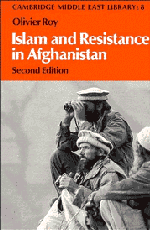Book contents
- Frontmatter
- Contents
- Acknowledgements
- Maps
- Introduction
- 1 State and society in Afghanistan
- 2 Islam in Afghanistan
- 3 The origins of Afghan fundamentalism and popular movements up to 1947
- 4 The Islamist movement up to 1978
- 5 The communist reforms and the repression, 1978–9
- 6 The uprisings, 1978–9
- 7 The establishments of political parties
- 8 The development of the parties between 1980 and 1984
- 9 The role of the Shiʿa in the resistance
- 10 Society and the war
- 11 From freedom fighter to guerilla
- 12 Military operations
- 13 The conflict from 1986 to the Soviet withdrawal
- 14 Cultural patterns and changes in society: an assessment
- 15 Afghan politics and the outside world
- Appendixes
- Notes
- Bibliography
- Index
6 - The uprisings, 1978–9
- Frontmatter
- Contents
- Acknowledgements
- Maps
- Introduction
- 1 State and society in Afghanistan
- 2 Islam in Afghanistan
- 3 The origins of Afghan fundamentalism and popular movements up to 1947
- 4 The Islamist movement up to 1978
- 5 The communist reforms and the repression, 1978–9
- 6 The uprisings, 1978–9
- 7 The establishments of political parties
- 8 The development of the parties between 1980 and 1984
- 9 The role of the Shiʿa in the resistance
- 10 Society and the war
- 11 From freedom fighter to guerilla
- 12 Military operations
- 13 The conflict from 1986 to the Soviet withdrawal
- 14 Cultural patterns and changes in society: an assessment
- 15 Afghan politics and the outside world
- Appendixes
- Notes
- Bibliography
- Index
Summary
When the coup of 27 April 1978 occurred, the new regime was not regarded as being communist either by political observers or by the ordinary citizens of the country. On 20 May, a specialist in Afghan affairs, Louis Dupree, published a letter in the New York Times under the heading: “A communist label is unjustified”. Nevertheless, the rhetoric of the regime left little room for doubt: it called for unity between workers, poor peasants and enlightened intellectuals to bring about the downfall of feudalism, talked of solidarity with socialist countries in their fight against imperialism, and published telegrams of support sent by international para-communist organisations. But long experience of Third World “revolutions” has led Western observers to expect a gap between revolutionary rhetoric and a more moderate approach to the exercise of power. Both the Afghan communist movement and the degree of Soviet penetration were largely underestimated. Babrak, Taraki and Amin, who were all well known as individuals, were regarded as political amateurs. It was thought that the USSR already had sufficient influence in Afghanistan and would therefore not wish to run the risk of a major political crisis by openly taking over a country already under its control.
Daoud was not popular in the country. The coup was generally seen as yet another example of padshahgardi, “political in-fighting within ruling circles”, which meant that power changed hands at the top without bringing about any fundamental change in society. Nevertheless, there were certain elements which were totally new.
- Type
- Chapter
- Information
- Islam and Resistance in Afghanistan , pp. 98 - 109Publisher: Cambridge University PressPrint publication year: 1990

